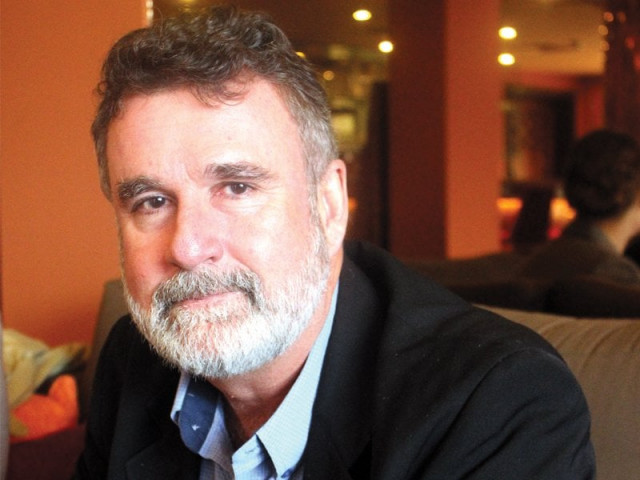To better understand Pakistan, US students need to come here, says American professor
US professor urges broader interaction and more reciprocity in US-Pakistani cultural exchanges.

US professor urges broader interaction and more reciprocity in US-Pakistani cultural exchanges.
“The ideal thing would be getting the US and Pakistan to a place — and some of it has to do with security questions — where US students can come here and meet people,” Michael Hannahan, an American professor, said.
Hannahan, the director of the University of Massachusetts Civic Initiative, recently visited Pakistan to meet some of the students he interacted with through the Study of the US Institute (SUSI) exchange programme.
The Civic Initiative — based out of the university campus in Hadley, Massachusetts — works toward promoting democracy through education. It has a Pakistani Young Leaders Programme which brings Pakistani students through the SUSI programme together with their American counterparts to discuss public policy issues.
The SUSI programme sends around 30 Pakistani undergraduate students to the US for six weeks each year to study at a US university. At the first-ever SUSI alumni reunion, which took place in Islamabad recently, Hannahan was reunited with his Pakistani students.
“People-to-people interactions are incredibly useful,” Hannahan told The Express Tribune. “But sometimes it is discouraging thinking how brief these interactions are.”
However, besides being brief, student exchanges might not represent all facets of both societies.
“We do tend to meet people that are already a little bit like us,” he said. “In other words, a student from the US who travels abroad is going to be a particular type of person, it’s the same with most Pakistani students travelling abroad. So there’s probably more familiarity there to begin with.”
The interactions should also be extended to people who might not have access to the other country’s citizens, Hannahan said.
He said creative programming that will bring US speakers to people in Pakistan who might not normally meet US citizens can help improve understanding between the countries.
“We all talk to people we already know,” he said. “Going to villages, talking to people who can just ask whatever questions they want. I think that kind of thing is very useful too.”
The US Embassy in Pakistan sponsors the largest US exchange programme in the world, including the largest Fulbright programme, with over 1,000 students and professionals travelling to the US each year. But the exchanges lack in reciprocity.
“It’s the other side that needs to happen,” Hannahan said. “People in Pakistan also need to see, and have discussions with US high school and college professors, policemen and doctors.”
This is Hannahan’s first visit to Pakistan but he said his visions of the country have been formed through years of conversations and discussions with Pakistani students he has taught.
“My initial impression is that Pakistan is a much more complicated place than most US citizens realise,” he said.
Based on his observations of the SUSI exchange programme, Hannahan said when Pakistani students first arrive in the US, they feel they are representing Pakistan, so they come with a certain point-of-view. But after people are there for a while, differences emerge within both, the groups of US students and the groups of Pakistanis.
“In other words, some US students will get in an argument with each other because they don’t want the Pakistanis to go back thinking that every American has the same opinion [about Pakistan],” Hannahan said.
“So you see this ongoing attempt to add layers of complexity about each person’s country,” he said. “And then everyone leaves with the feeling that both sides are a whole lot more complicated than they thought.”
Public policy is a great place to understand each other’s countries, Hannahan said.
If you take a specific policy issue such as the funding of a public school and then discuss how it takes place in the US and in Pakistan, all other parts of the culture come in to play and you start to see the differences in how things work, not only the other’s country, but also your own, he said.
Hannahan was also supposed to be accompanied by six American students but their plans were cancelled at the last minute due to Tahirul Qadri’s long march in Islamabad.
During his stay, delivered two talks arranged by the US Consulate in Karachi on civil rights, tolerance and the differences in generational attitudes in the US.
Published in The Express Tribune, January 28th, 2013.



















COMMENTS
Comments are moderated and generally will be posted if they are on-topic and not abusive.
For more information, please see our Comments FAQ